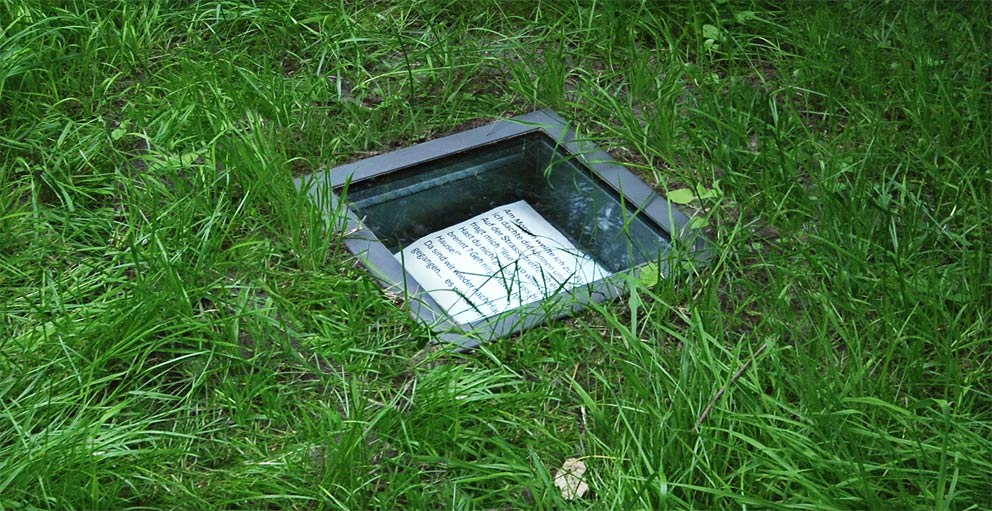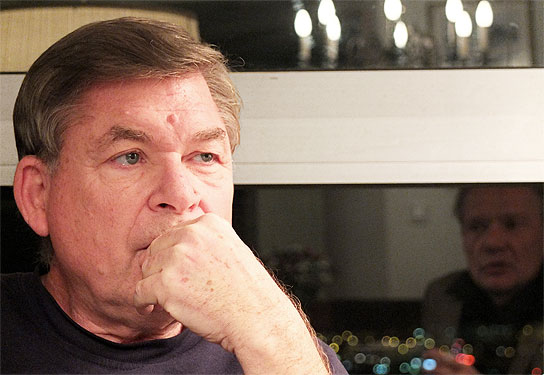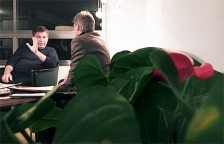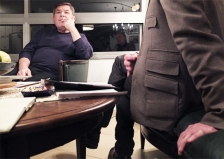


Who am I, then? Well I am Yoram Jacobson, son of Margarete Jacobson, who emigrated from Marburg in the year ’39. To Israel, then still called Palestine, at the eleventh hour, that is on the very last ship the British allowed to come to Haifa. That was shortly before the war broke out. Due to my parents I have a profound bond to Germany, but a very ambivalent one.
My grandmother died in ’39, which was very lucky for her. That means she did not have to witness any of the terrible things which happened later on. My grandfather stayed on at the house, Wettergasse 4, for another year or two, then he was forced to leave the house, which was “aryanized“, and he was shunted to a Judenhaus and then to another Judenhaus and then to yet another Judenhaus until they deported him to Theresienstadt and there he died.
Yes, I know it all. My father was even put into a concentration camp, into Buchenwald, after the Kristallnacht, I believe for three weeks. At that time all Jewish men beyond a certain age, no children, were deported to Buchenwald, also to Dachau and other places. And there they beat up the people, and in some cases also killed them. My father has seen it, has told me about it. At bottom it was not yet a case of organized extermination at this time, but the purpose clearly was to tell people: Leave Germany as fast as you can, that is at once! And so it was indeed, many did not make it. My uncle, my mother’s brother, who used to be a very successful lawyer in Berlin, lost his job in ’33 when Hitler came to power. And he saw clearly that he had to leave Germany right away and to emigrate to Palestine. So he was here already. He had had the opportunity to get certificates for my parents. And so they were in luck and could emigrate to Palestine.

When I came to Marburg for the first time I knew the city as if I had lived there for years. Our house was a house in which people talked a lot. In many families people kept silent, the parents did not tell you anything, did not talk about anything. At our place people talked. And I also knew Marburg, and Halberstadt too, quite well although I had never been there, just from the many stories.
My mother did emphatically not want to come back to Germany, ever again. It was out of the question. Several times I asked her to travel with me to Germany. But there was nothing doing, she did not even want to hear about it. Yet nevertheless I distinctly felt that she had a strong emotional bond to Marburg. As I said, I knew Marburg as if I had lived there myself. Nobody had to explain to me where to go, or where the various destinations were. I knew exactly.
Marburg, Halberstadt, and I would even go so far as to say Germany, plays quite an important role. It is hard for me to say something like this, but anyhow, somehow: a kind of home. (so o.k.?)
I don’t belong to Germany. In this sense it is not home to me, but still I come from there… I grew up there, so to speak. Not only do I know Germany well, I know the German language… I know how it works, I understand the expressions very quickly, typical German expressions, no, not expressions… how do you say that in German? The facial expressions.
With my father I also spoke German, but my father had an excellent command of the Hebrew language. My mother did not know a word of Hebrew, she never learned it. Are you familiar with the term Jeckes [German immigrants to Israel]? Well, my mother lived here in Israel for more than sixty years just like so many Jeckes, but she did not know Hebrew, could not talk with the grandchildren. That was quite sad, but… She never learned it. I talked with her exclusively in German. And then I also frequently come into contact with the German language because of my academical work, and that is why I speak German quite fluently.
I have a very ambivalent attitude towards Germany and the Germans. This has never changed. In 2006 we lived in Berlin for six months, on a sabbatical. And every day I felt that, that is this ambivalence, those… two aspects. On the one hand I feel very close to it, know it, belong, am a part of it. On the other hand I cannot stand it.
From time to time we got to know people and got into a conversation with them and they invited us. Always I keenly felt those two aspects, this internal fissure, so to speak. From the one side I was attracted, and felt I was a part of it, but from the other side I was utterly repelled (so o.k.?), those facial expressions, how the German language is spoken, the various expressions which were largely unknown to me because the language has changed since those times, well… My idiom is stuck in the year ’39. That was the language of my parents.
I do not know what it was like and which expressions people used in these days, but in any case… it is about the same language, the same basic character, up to the present day, although Germany has undoubtedly changed. We lived in Berlin, in East Berlin, opposite our house there was a Nazi club.
We have had many terrible experiences in the streets, in the subway. Everywhere, again and again, we experienced it, this hate for Jews, harsh expressions. Frequently I wanted to show some reaction to that, but my wife always restrained me. After all that can also become dangerous. Well, now that has stayed with me. This ambivalence has never vanished, never changed. For example, I was entitled to get a German passport. I never wanted that, but my children wanted it. And then it turned out that they cannot obtain a passport from the German embassy here in Tel Aviv unless I got one in the first place. So I have to have the passport, and then they can also get theirs. It was exceedingly hard for me to apply for this passport. You know I did not want it anyway after all, it has been put away somewhere in the closet. I never use it at all.
I have met a woman who used to work in the German Army, twenty kilometers from Auschwitz, as a young officer. She has told me frankly: We knew exactly what was happening there, but nobody talked about it.
What would you like to tell the people who visit the site of the former synagogue?
Try to understand how it was possible that what happened there could happen at all. How it could come to this point. And how could people take part in something like this?
For me it is obvious, perfectly obvious, that many Germans… I mean, I don’t know whether all Germans… that may be too harsh, but many… most of them knew, whether in detail or in broad outline, what was going on with the Jews. Many people in Germany also told me… For example I met somebody in Marburg who told me that in April of ’42, when my grandfather was deported to Theresienstadt, he went hiking with his father. And when he saw all the Jews, by then there were not all that many of them left, in the railway station, he asked his father: What is going on there? And the father answered him: Don’t look over there. Don’t ask, you don’t need to know anything.
For me the memorial is not important, For me personally it is not important. But for the people who live there, for the German, for the Marburg citizen.
I would like to have a Stolperstein in front of my grandparents’ house, one sees them all the time in Germany nowadays and almost everywhere, in Berlin there are a lot of them…
You know I asked myself that several times already, for whom they should be installed in the first place. Not for me, I don’t need it. But for the people passing by. For the Germans, so that they stop for a minute despite themselves and think about the fact that Jews used to live there in former times, and they were driven away from there, deported and killed.

